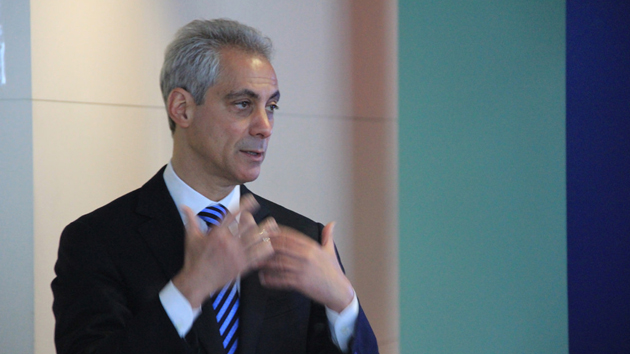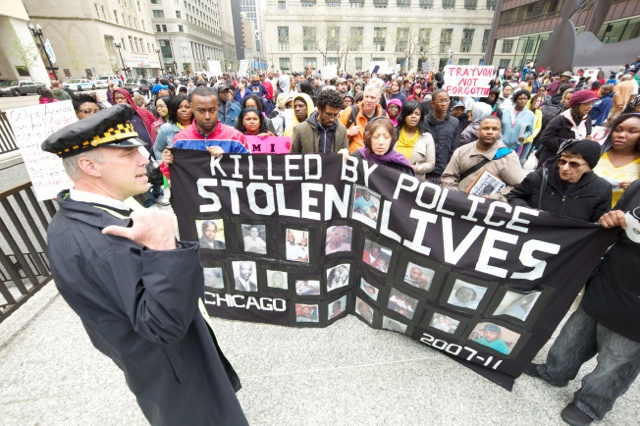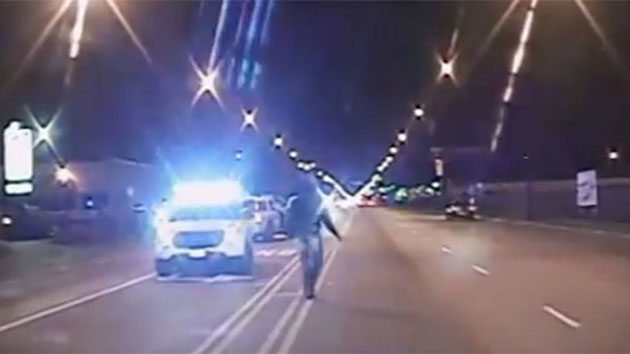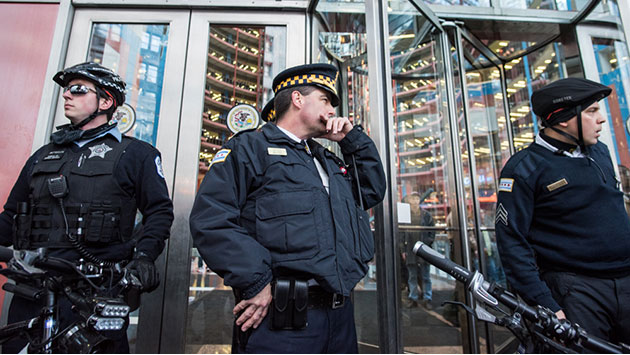
Chicago police stand guard at the doors of the Thompson Center during a mass protest on December 9, 2015. Max Herman/The Chicago Reporter
This story appears courtesy of the Chicago Reporter, a nonprofit investigative news organization that focuses on race, poverty, and income inequality.
In the fallout from the release of the Laquan McDonald video, Chicago’s top cop lost his job. But the police officer who shot the teenager 16 times is still employed.
Officer Jason Van Dyke, who is captured on police dash cam video shooting McDonald, can thank the police union.
The Fraternal Order of Police contract with the city shapes how Chicago handles police misconduct allegations, disciplines rank-and-file officers, as well as when the city pays legal costs for police officers accused of wrongdoing. While activists have long called for changes to the contract, many people in local government have not been eager to take on that fight—until now.
With cries of reform ringing louder than before and a federal investigation of the police department, aldermen are demanding changes to a union contract that breezed through the City Council in 2014.
“Yes, the FOP is strong,” said Dick Simpson, a political science professor and former Chicago alderman. “But there is huge public pressure at the moment to provide oversight for police and to curb police abuse and corruption.”
The police contract expires in 2017. The Black Caucus is demanding that an officer’s liability risk be tied to their employment, as well as other changes, including tougher punishment for misconduct.
Ald. Howard Brookins (21st) said the contract makes it harder to cut ties with cops like Van Dyke who had numerous citizen complaints against him and had reportedly cost the city more than $500,000 in legal settlements and fees. And critics said the evidence against Van Dyke was damning enough for him to be fired immediately.
“We have to be able to get rid of bad police officers,” Brookins said. “Maybe that’s something we shouldn’t have to bargain for.”
The union contends that changes to the contract would discourage people from becoming cops.
FOP President Dean Angelo said the contract contains fair and necessary protections for cops and doesn’t tie authorities’ hands in misconduct cases such as Van Dyke’s as much as some people think. He cast the aldermen as opportunists riding the wave of public outrage over a white cop shooting a black youth.
“It’s easy now in this environment to point fingers at us,” Angelo said.
Brookins acknowledged that there hasn’t been momentum on the council to change the contract. But now, he said, “There is a political will.”
The police contract
The current police contract, which was approved by the City Council unanimously in November 2014, sets the bar high for firing or suspending a cop.
Part of the agreement, known as the police bill of rights, gives cops a layer of due process beyond what most citizens enjoy. The contract allows officers to get in writing information about an investigation, including who will question them and what they’ll be asked. Cops who shoot civilians can delay making an official statement for several days, and investigators can’t interview them without providing transcripts of every prior interviews or notifying them.
Another union protection came into play in McDonald’s death. Experts suggested the officers who saw the shooting—whose accounts clash with the video—should have been subject to lie detector tests, but the police bill of rights in the contract gives them the right to refuse the tests. In addition, police complaint and disciplinary records must be destroyed in five or seven years based on the type of alleged offense, making it harder to show a pattern of misconduct.
The union recently halted a city effort to grant requests for police misconduct records dating back to the 1960s, arguing that the city violated the union agreement by keeping the files. Investigators are also limited in how they can use past allegations of abuse to resolve new claims, according to the contract.
The superintendent has to file charges with the Chicago Police Board and win an evidentiary hearing to fire an officer or issue a lengthy suspension. Even when investigators sustain allegations against an officer, the contract allows police to skirt the police board. For example, if the Independent Police Review Authority recommends suspending an officer, the contract lets him appeal the decision through arbitration, a process that experts characterize as heavily stacked in favor of cops.
“The incentives of the chief of police on down are further dampened by the knowledge that anything they do can be undone easily in arbitration,” said Max Schanzenbach, a law professor at Northwestern University. “So they have these cops well known to have numerous citizen complaints and settlements paid out for them, but they’re not dismissed from the force.”
Angelo contends that the FOP shields its officers from unfair discipline due to unfounded allegations just as any union would do for its members. He said the life or death stakes many cops operate under and the possibility of false complaints affords them special consideration.
While the public has expressed outrage over cops like Van Dyke, who, until recently, collected a check on desk duty, there’s little the city can do if the cop hasn’t been charged with a crime or had a complaint against them sustained.
The police department was able to suspend Van Dyke without pay when he got charged with murder by the State’s Attorney’s office a year after McDonald’s death, but the department did not fire him. The Independent Police Review Authority froze its investigation after forwarding the case to county prosecutors.
A call for contract reform
Ald. Ameya Pawar (47th) said he wants a separate expedited disciplinary process in the contract for fatal shooting cases like Van Dyke’s where evidence of excessive force is obvious, even without criminal charges or a drawn out investigation.
“There are a lot of questions around why this officer was not removed,” Pawar said.
Some aldermen are scrutinizing the issue of indemnification, or covering legal costs for cops sued for alleged misconduct.
Ald. Pat Dowell (3rd) released a statement calling for the police union to chip in for misconduct settlements, which cost the city more than $50 million last year. She argued that “residents of Chicago should not be solely responsible for the cost of settlements in police cases.”
Ald. Will Burns (4th) a close ally of the mayor, also issued a statement that said “officers with a high number of complaints are a liability for the city of Chicago, and erode the critical trust between police and community.” He said the contract should be reviewed to allow authorities to suspend or fire cops with too many complaint as well as officers subject to excessive force lawsuits settled by the city.
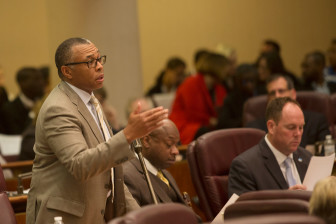
Brookins suggested the city should take a cue from the private sector and write risk management clauses into the union contract.
“If you kept getting your company sued and cost them millions of dollars, you would be out of there,” he said. “And if you kept getting in too many car accidents, even if you said they weren’t your fault, your insurance company would drop you as a liability risk.”
But Angelo said that making an officer’s liability risk cause for termination would discourage people from signing up for a job that is inherently risky.
“We do a job less and less people want,” Angelo said. “That would minimize the population of people who want to perform this calling.”
Critics of the union contract don’t just want to change what’s in the agreement. They also want to change the negotiation process and give the public a forum to air concerns well in advance of a City Council vote on the contract.
Not much public input, if any, goes into union contract negotiations. The FOP and the city’s negotiators typically hammer out an agreement in private, sometimes with the help of an independent arbitrator, and present it to City Council for a vote.
Several experts said the city should hold public hearings about the police contract before negotiations are finalized.
“We need to put some sunlight on those union provisions that are offensive and which ones need to be changed, and then organize at the local level to get city council and mayors who won’t yield to union demands,” said police misconduct expert Sam Walker. “The police union is very effective in playing the crime card against their critics: ‘Oh, you’re against the police, you support the criminals.’ They’ve been doing that for decades.”
Despite increasing national scrutiny of police union contracts and how they affect police accountability, Walker said that they are still an underrated issue. That’s partly because much of the public isn’t aware of their problematic provisions, he said, but also because police unions have proven adept at getting their way in city halls and statehouses across the country.
Brookins and Schanzenbach both said that some of the most challenging concerns about the contract would require changes to state law. Illinois requires cities to negotiate disciplinary procedures as part of collective bargaining and foot the bill for cops sued for misconduct. A state law known as the police officer bill of rights was modeled after one of the most criticized parts of the contract.
But there’s still a lot officials and residents in Chicago can do, Walker said, including targeting the next round of contract negotiations.
“When a contract comes up for a vote by City Council,” Walker said, “it’s too late.”
Angelo said FOP has not been twisting the city’s arm in negotiations.
“The contract has been negotiated for almost 35 years,” he said, “and we certainly didn’t pull the wool over officials in the city of Chicago’s eyes time and time again.”
Political will to take on the FOP
Fighting the FOP isn’t easy. Matthew Piers, who was a top city lawyer under Mayor Harold Washington, said he lost his battle against the union in the 1980s. When Piers, now 64, joined the Chicago Law Department in 1984, the city had approved Chicago’s first FOP contract several years earlier. He had to work within the framework of union agreements made by Washington’s predecessor, Jane Byrne. One of those agreements was the indemnification clause, and Piers was charged with deciding whether the city would pay legal costs for police officers accused of misconduct.
Piers quickly ran afoul of the union for his refusal in numerous cases to foot the bill for cops he believed had intentionally harmed civilians. One such case involved a cop who was accused of raping a woman in the back of his car. The physical evidence, Piers said, left little doubt that nonconsensual sex had occurred, so he declined to represent the officer. But the FOP, which blasted him as anti-police for his stance, took the case to arbitration, citing the union contract. The arbitrator ordered the city to pay legal bills for the officer, who Piers said kept his job.
“Your conduct could cost the city millions with there being no repercussions for you as an individual,” Piers said. “That disconnect—I found it troubling then, and I find it troubling now.”
There have been several versions of the FOP contract ratified since the 1980s, but the provisions that City Council members want to put under a microscope aren’t new.
Angelo wonders why aldermen are talking so tough about a contract that they approved just last year. Aldermen could have questioned the contract or raised the issue of discipline, but, Angelo said, “I didn’t hear a word from any of them.”
“I don’t know if those people read what they voted on,” he said. “But if they didn’t read this contract before they voted on it and now are blaming us—shame on them.”
Brookins said he has raised concerns about the FOP contract in the past, but didn’t feel he had the political capital to be more vocal or force a change until now.
“Even when I was first elected in 2004, it was not popular or desirable to talk against the police,” Brookins said. “Everybody wanted to be the friend of law enforcement, to be tougher on crime, and going against the police, they equated that as siding with the criminals. So lawmaker after lawmaker has been tougher and tougher on crime, saying we support our police officers. So almost anything they bargained for they got.”
